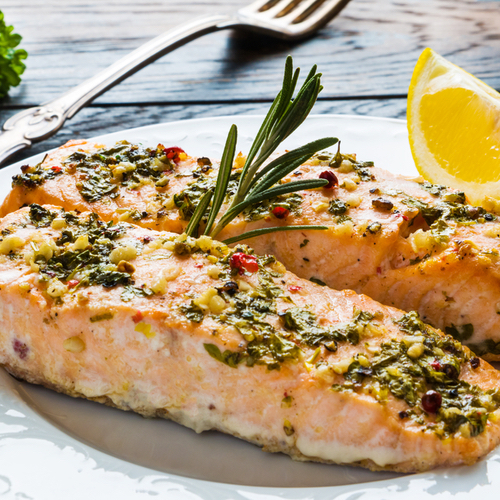
Fatty Fish
Fish is one of the best sources of protein because it is simultaneously loaded with healthy fats as well, meaning that it has an enhanced ability to keep you full while providing your body with a variety of other nutrients. “[Fish] is an excellent source of omega 3 fatty acids and vitamin D to reduce inflammation, regulate immune health, and support digestion,” explains nutritionist Heather Hanks.
Regularly consuming fish (although not daily because this can lead to mercury poisoning) can even allow you to eat smaller portions and achieve a calorie deficit without depriving yourself as it is a high value food which will actually fill you up and keep you satisfied. “Try a salmon salad with low-carb veggies for lunch to promote satiety, increase energy levels, and improve digestion. Salmon also goes well with veggies at night or an omelette in the morning,” suggests Hanks.
Eggs
Eggs are a dietitian favorite as a source of protein, and for good reason. Low in calories and high in protein, eating eggs for breakfast each day kicks off your morning with a breakfast that will offer ample energy to go about your morning while reducing your need to snack. “On average, eggs contain about 6 grams of high-quality protein and only 78 calories. Higher protein diets often mean high levels of satiety. Part of this is because protein positively affects satiety hormones like cholecystokinin, which helps to inhibit gastric emptying (a.k.a. keeping us fuller for longer),” explains registered dietitian Arika Hoscheit.
The protein content in eggs means that they take longer to digest than a carb heavy breakfast, which Hoscheit explains is due to the larger molecules which require more energy to break into amino acids than carbs. “High protein foods like eggs help you to feel satisfied for longer periods, making you less likely to reach for unnecessary calories,” he says. Eggs can also help to regulate your blood sugar, helping to suppress cravings in order to manage overeating and unnecessary snacking throughout the day.
Beans and Legumes
If you follow a plant-based diet, beans and legumes are going to be your best bet for consuming adequate amounts of protein to support weight loss and maintenance. Not only are they a fat-free protein source, but they are also composed partially of fiber and carbohydrates which can help to fill you up and offer slow releasing energy throughout the day. Beans are also great for digestion, so if you struggle with constipation, upping your bean intake can help you to lose weight while also improving your regularity. Registered dietitian Laura Sebring notes that some forms of beans such as lentils and chickpeas are also high in magnesium which can help to boost your metabolism, making it even easier to burn fat at rest and achieve your weight loss goals without depriving your body of the nutrients it needs.


